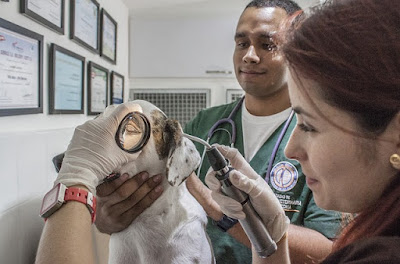Before arriving for your next appointment, help your vet to help your pet by avoiding these common mistakes that drive veterinarians crazy.
Unruly Pets
A rambunctious pet can slow down your veterinary visit and eat up valuable time. With lots of animals to see, wrangling a stressed out pet is the last thing your vet wants to deal with. To prepare your animal for a lifetime of smooth appointments, consider dropping by your veterinarian’s office for a few friendly, no-pressure visits.
“Try bringing your pet in strictly for social visits,” recommends Dr. Jessica Downing, general practitioner and emergency veterinarian at Valley Cottage Animal Hospital in Valley Cottage, New York. “Make the visit a positive experience by offering lots of treats, visiting with the front desk staff for hugs and kisses, and practicing placing your puppy or kitten on and off the exam table. It’ll make the experience more familiar and less stressful.”
Unprepared Pet Owners
“Gathering all the necessary information from various sources can really take away from their appointment,” advises Crystal Morrin, ophthalmology technician at the Center for Animal Referral and Emergency Services in Langhorne, Pennsylvania. “Even something like illegible handwriting in your pet’s records can slow things up, so it’s important to come prepared with as much knowledge about [your pet] as possible.”
Downing agrees that having a firm knowledge of your pet’s medical history is very helpful and appreciated. “Any information regarding previous vaccinations, medications, and surgeries is helpful,” she says. “This way, the veterinary staff will know what your pet may require in terms of vaccinations, lab tests, and medications during the office visit, which could speed things up.”
Absentee Pet Parents
Nobody knows your pet better than you, and making yourself available to answer questions about your pet ensures a smooth visit. If you’re the primary owner, try to be the one to take your pet to the vet. If a friend or family member must, make sure they’re knowledgeable about your pet and what symptoms they may be experiencing.
“Important details, such as what type of food your pet eats, changes in your pet’s behavior, or what the pet may have been exposed to can best be answered by the person who spends the most time with your pet,” says Downing. “You’re the person who feeds them every day, plays with them, and tends to their daily needs, so odds are you know the most about their day to day life.”
Procrastinating the Visit
If something seems wrong with your pet, it’s best to make an appointment as soon as possible. Putting off a visit could result in worsening symptoms that could potentially become more difficult to treat. And don’t try to cram preventive care and addressing health problems into a single vet visit.
“To address your pet’s medical concerns more thoroughly and effectively, we recommend not waiting for your pet’s yearly visit to discuss their health concerns with your veterinarian,” says Downing. “It’s better to be safe than sorry when dealing with the health of your pet.”
Not Reading Discharge Instructions
If your pet is leaving with a new medication or follow up appointment, be sure to carefully read your discharge instructions before you exit. If there’s something you’re not clear on, speak up and don’t be afraid to ask questions.
“Discharge instructions will always specify the recommended treatment while reiterating the diagnosis and next steps,” explains Morrin. “Keeping them in a safe place and using as a reference doesn't just help us, it helps the client stay on the same page as us.”
